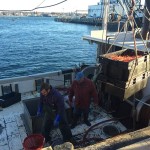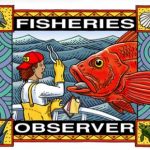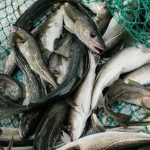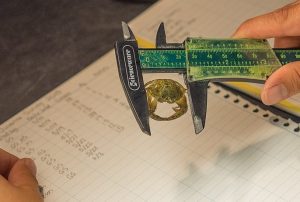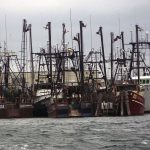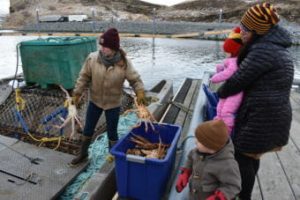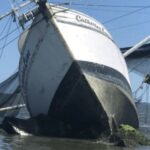Tag Archives: Pacific Coast Federation of Fishermen’s Associations
Tension grows among Bay Area crab fishermen to find whale-safe alternative crabbing methods
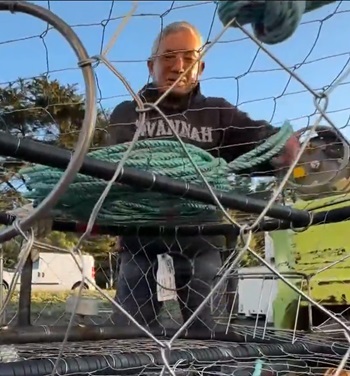 State regulators say the prevalence of marine life including humpback whales is too high for crab fishing to begin. Now there’s a growing tension among crab fishermen about alternative methods of whale-safe fishing to offset the losses of increasingly shortened seasons. Dick Ogg is a crab fisherman who also spends countless hours driving up and down the coast, advocating for others in the business without getting paid. Fishing is in the 72-year-old’s veins. Between calls with regulators and industry decision makers, Ogg prepares his own crab pots, employing just two deckhands who work in the side-yard of his home to save costs. But the Bodega Bay resident is concerned about a years-long push to promote high-tech “pop-up” fishing gear as the solution for whale-safe harvesting in the spring after the season ends. Video, more, >>CLICK TO READ<< 09:26
State regulators say the prevalence of marine life including humpback whales is too high for crab fishing to begin. Now there’s a growing tension among crab fishermen about alternative methods of whale-safe fishing to offset the losses of increasingly shortened seasons. Dick Ogg is a crab fisherman who also spends countless hours driving up and down the coast, advocating for others in the business without getting paid. Fishing is in the 72-year-old’s veins. Between calls with regulators and industry decision makers, Ogg prepares his own crab pots, employing just two deckhands who work in the side-yard of his home to save costs. But the Bodega Bay resident is concerned about a years-long push to promote high-tech “pop-up” fishing gear as the solution for whale-safe harvesting in the spring after the season ends. Video, more, >>CLICK TO READ<< 09:26
Commercial salmon fishermen eye Klamath dam removal with cautious hope
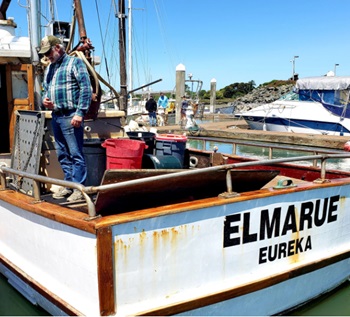 At 76, he still fishes for salmon alone. Standing in the cockpit on the stern deck of his wooden trawler, Elmarue, he can keep an eye on all six wires; when one of the lines starts to dance, he brings the fish in, stunning it with his gaff while it’s still in the water. Then he uses the tool to hook the salmon behind the gills and swings it onto the deck. “By the way, I want that fish cleaned and chilling in a single water flush within half an hour; that’s the standard,” says Dave Bitts. “I want you to enjoy eating it as much as I enjoyed catching it.”In April, for the second year in a row, the Pacific Fishery Management Council voted unanimously to close California’s commercial and recreational ocean salmon fishery. The closure was based on woefully low numbers of adult salmon expected to return to several California rivers. more, >>CLICK TO READ<< 12:58
At 76, he still fishes for salmon alone. Standing in the cockpit on the stern deck of his wooden trawler, Elmarue, he can keep an eye on all six wires; when one of the lines starts to dance, he brings the fish in, stunning it with his gaff while it’s still in the water. Then he uses the tool to hook the salmon behind the gills and swings it onto the deck. “By the way, I want that fish cleaned and chilling in a single water flush within half an hour; that’s the standard,” says Dave Bitts. “I want you to enjoy eating it as much as I enjoyed catching it.”In April, for the second year in a row, the Pacific Fishery Management Council voted unanimously to close California’s commercial and recreational ocean salmon fishery. The closure was based on woefully low numbers of adult salmon expected to return to several California rivers. more, >>CLICK TO READ<< 12:58
Some Fishermen Blame California Water Policies for Salmon Season Closures
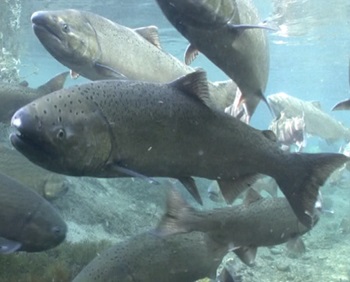 The Pacific Fishery Management Council unanimously recommended the closure of all California commercial and recreational ocean salmon fisheries through 2024, after a similar closure last year, blaming drought, climate and other factors for dwindling stocks. “While incredibly painful to fishing families and fishing communities, the Pacific Coast Federation of Fishermens Associations supports the closure,” said George Bradshaw, president of PCFFA. “We all need to be doing everything we can to give Californias salmon a chance to recover. It has to be an all hands-on deck effort to ensure survival for our Central Valley and Klamath salmon runs.” Video, more, >>click to read<< 09:14
The Pacific Fishery Management Council unanimously recommended the closure of all California commercial and recreational ocean salmon fisheries through 2024, after a similar closure last year, blaming drought, climate and other factors for dwindling stocks. “While incredibly painful to fishing families and fishing communities, the Pacific Coast Federation of Fishermens Associations supports the closure,” said George Bradshaw, president of PCFFA. “We all need to be doing everything we can to give Californias salmon a chance to recover. It has to be an all hands-on deck effort to ensure survival for our Central Valley and Klamath salmon runs.” Video, more, >>click to read<< 09:14
California’s ocean salmon fishing season closed for second year in a row
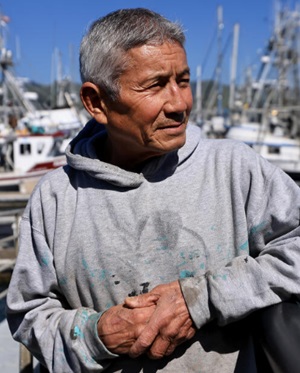 California’s commercial and recreational ocean salmon fishing season is set to be closed for the second consecutive year, another blow to the state’s beleaguered industry suffering from the combined fallout of drought, climate disruption and deteriorating ocean conditions. Already, a new request is underway for yet another federal disaster declaration to help alleviate some of the wide economic damage from the closure, affecting not just the fleet but many associated businesses that depend on the fishery, one of the state’s most lucrative. Many fishermen, already resigned to a severely limited season if any at all due to depleted stocks, had backed the full closure. “For nine months now, we’ll probably be without income. When you look at overall impact, it’s significant. Do we want the closure? Obviously, no. Is it necessary? Yes,” said Dick Ogg, a Bodega Bay commercial fisherman and president of the Bodega Bay Fishermen’s Marketing Association. Photos, more, >>click to read<< 07:43
California’s commercial and recreational ocean salmon fishing season is set to be closed for the second consecutive year, another blow to the state’s beleaguered industry suffering from the combined fallout of drought, climate disruption and deteriorating ocean conditions. Already, a new request is underway for yet another federal disaster declaration to help alleviate some of the wide economic damage from the closure, affecting not just the fleet but many associated businesses that depend on the fishery, one of the state’s most lucrative. Many fishermen, already resigned to a severely limited season if any at all due to depleted stocks, had backed the full closure. “For nine months now, we’ll probably be without income. When you look at overall impact, it’s significant. Do we want the closure? Obviously, no. Is it necessary? Yes,” said Dick Ogg, a Bodega Bay commercial fisherman and president of the Bodega Bay Fishermen’s Marketing Association. Photos, more, >>click to read<< 07:43
Dungennes crab fishery held up again by recent whale and turtle entanglements
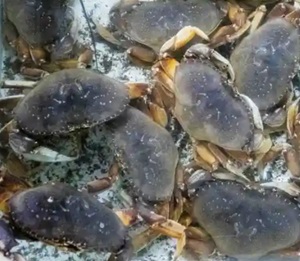 Before the restrictions, the crab fishing season off California started before Thanksgiving, in plenty of time for holiday tables. In recent years, fishermen’s ability to drop their gear has been pushed back because whales and turtles were still be spotted in their fishing zones. This season, fishermen can start dropping their crab pots on Jan. 5, and only in the two most northern California zones. In central and southern California no start date has been announced. Officials with the Pacific Coast Federation of Fishermen’s Associations said the industry does its best to avoid whales and have accepted limiting the seasons, but notes that since the restrictions have been in place, the industry has dropped from 450 active vessels to fewer than 100 and has lost out on tens of millions of dollars. more, >>click to read<< 07:47
Before the restrictions, the crab fishing season off California started before Thanksgiving, in plenty of time for holiday tables. In recent years, fishermen’s ability to drop their gear has been pushed back because whales and turtles were still be spotted in their fishing zones. This season, fishermen can start dropping their crab pots on Jan. 5, and only in the two most northern California zones. In central and southern California no start date has been announced. Officials with the Pacific Coast Federation of Fishermen’s Associations said the industry does its best to avoid whales and have accepted limiting the seasons, but notes that since the restrictions have been in place, the industry has dropped from 450 active vessels to fewer than 100 and has lost out on tens of millions of dollars. more, >>click to read<< 07:47
Sonoma County snags disaster relief designation for salmon fishery devastation
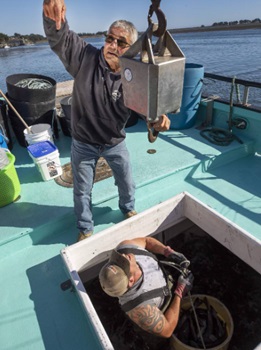 “Small businesses in Sonoma County that rely on salmon fishing for their livelihood were devastated when the fishery was shut down,” said county Supervisor Lynda Hopkins, whose district encompasses the Sonoma Coast. Hopkins added the business loans are intended “to help them recover. The SBA also lists other, bordering counties, with the presumption that those “may have suffered economic injury as well.” These include Napa, Marin, Solano, Mendocino and Lake. “We have lost 80% of our fleets in the last 40 years,” said Glen Spain, executive director of the Pacific Coast Federation of Fishermen’s Associations, which manages about a dozen fishing groups. He defined California’s $45 million fishing industry as being especially hard hit with state Fish and Wildlife’s permits dropping from 7,744 in 1980 to 1,006 this year. “These loans are trying to keep people intact as much as possible,” Spain said. photos, more, >>click to read<< 14:38
“Small businesses in Sonoma County that rely on salmon fishing for their livelihood were devastated when the fishery was shut down,” said county Supervisor Lynda Hopkins, whose district encompasses the Sonoma Coast. Hopkins added the business loans are intended “to help them recover. The SBA also lists other, bordering counties, with the presumption that those “may have suffered economic injury as well.” These include Napa, Marin, Solano, Mendocino and Lake. “We have lost 80% of our fleets in the last 40 years,” said Glen Spain, executive director of the Pacific Coast Federation of Fishermen’s Associations, which manages about a dozen fishing groups. He defined California’s $45 million fishing industry as being especially hard hit with state Fish and Wildlife’s permits dropping from 7,744 in 1980 to 1,006 this year. “These loans are trying to keep people intact as much as possible,” Spain said. photos, more, >>click to read<< 14:38
California’s Central Valley Chinook Are Getting Lost on Their Way Home
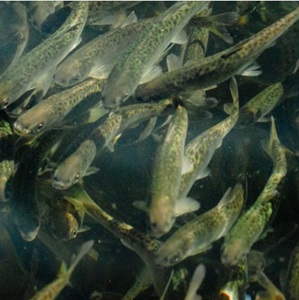 Picture yourself: a chinook salmon in the prime of your life. You dart through the water off California’s central coast, winding through kelp and dodging hungry sea lions. Long, sleek and silver, dappled with dark spots. Eyes wide and vigilant. More than 20 kilograms of pure muscle. You’ve been out at sea for several years now, first voyaging north along the Oregon coastline, then westward into deeper water. As winter approaches and the days grow shorter, you’ve found your way back to California. You’ve felt the seasons turn before, but this year, it means something special. Your kind, the Central Valley chinook—what fishers call the king salmon—are not born at sea. For thousands of years, your ancestors began their lives in the heart of California, where tributaries and streams flow together to form the mighty Sacramento and San Joaquin Rivers. photos, >>click to read<< 08:31
Picture yourself: a chinook salmon in the prime of your life. You dart through the water off California’s central coast, winding through kelp and dodging hungry sea lions. Long, sleek and silver, dappled with dark spots. Eyes wide and vigilant. More than 20 kilograms of pure muscle. You’ve been out at sea for several years now, first voyaging north along the Oregon coastline, then westward into deeper water. As winter approaches and the days grow shorter, you’ve found your way back to California. You’ve felt the seasons turn before, but this year, it means something special. Your kind, the Central Valley chinook—what fishers call the king salmon—are not born at sea. For thousands of years, your ancestors began their lives in the heart of California, where tributaries and streams flow together to form the mighty Sacramento and San Joaquin Rivers. photos, >>click to read<< 08:31
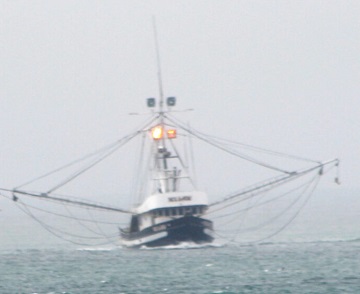
USDA will invest $52 million to help fishing industry on the West Coast
The struggling fisheries industry on the West Coast is getting a much-needed financial boost from the federal government. The U.S. Department of Agriculture announced it will buy $52 million worth of Pacific groundfish for its food assistance programs. The money is the USDA’s third and biggest investment in the fish in as many years. In 2021, the USDA purchased $16 million of groundfish, specifically rockfish, pink shrimp and whiting or hake, a fish that’s popular in Eastern Europe. It increased that to up to just over $30 million the following year. This year’s $52 million surpasses the $50 million in wholesale sales for those fish last year, according to the Oregon Department of Fish and Wildlife, which tracks fisheries in Oregon. >click to read< 09:50
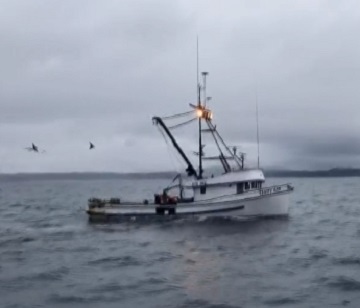
Imperiled Chinook salmon runs close ocean fishing off California, much of Oregon
The closure currently runs through May 15 and affects a length of the coast stretching from Oregon’s Cape Falcon, near Cannon Beach, south to the Mexican border. And it could be extended, officials said, as the imperiled species struggles amid a long-running drought. Further closures are likely, said Eric Schindler, head of the Oregon Department of Wildlife’s Ocean Salmon Program.“It doesn’t look good for this year or next year, and possibly the year after that, because of the drought conditions in California,” Schindler said. “We have to make sure that we’re not undermining our ability to produce salmon for the next go around.” Video, >click to read< 10:35
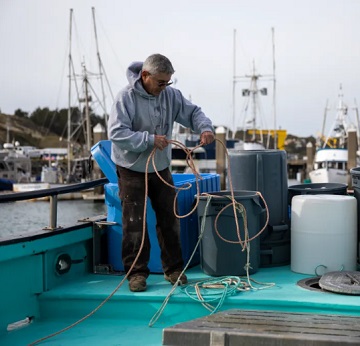
No California salmon: Fishery to be shut down this year
Last year, California’s commercial and recreational fishing fleet, from the Central Coast to the Oregon border, landed about 300,000 salmon. But this year, Davis and other salmon anglers won’t be fishing for salmon at all. Last year, the industry’s economic value was an estimated $460 million for fish sales and related businesses, including restaurants, tackle shops, private fishing guides, campgrounds and other services. Salmon season usually runs from May through October. Only in two previous years — 2008 and 2009 — has California’s salmon season been shut down completely. That closure came as the numbers of spawning fish returning to the Sacramento River, the state’s main salmon producer, crashed to record lows. Now California’s Chinook runs have collapsed again. >click to read< 09:54
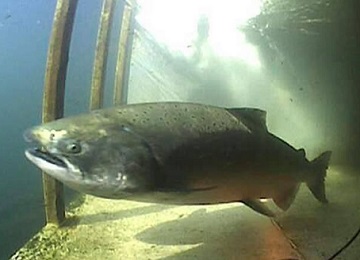
PD Editorial: Listen to fishermen: Skip salmon season
When people call for action that goes against their own short-term interests, something bigger must be at stake. The public should pay attention. So, it is with three associations of West Coast fishermen that have called for a shutdown of this year’s California salmon fishing season. Members of all three associations know that a closure will cost them dearly, but they understand that this year’s pain is the best chance for long-term survival. But the people who know salmon best and rely on them most — members of the Pacific Coast Federation of Fishermen’s Associations, the Golden Gate Fishermen’s Association and the Northern California Guides and Sportsmen’s Association — say that it’s time for a pause. >click to read< 11:44
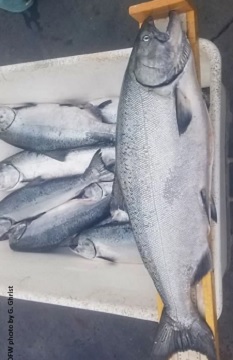
Facing Dismal Salmon Population Forecast, Fishermen’s Groups Call for Immediate Closure of Season, Request Disaster Assistance
Facing some of the worst salmon fishery numbers in California’s recorded history, a coalition of sport and commercial fishermen’s groups is calling on state regulators to immediately cancel the 2023 fall salmon season. The request comes two days after the California Department of Fish and Wildlife’s annual pre-season salmon informational meeting, where agency personnel delivered a dismal 2023 abundance forecast. From the press release, Today, leadership of the Pacific Coast Federation of Fishermen’s Associations, the Golden Gate Fisherman’s Association, and the Northern California Guides and Sportsmen’s Association are calling for an immediate closure of the 2023 salmon season and requesting [that] Governor Newsom, the State Legislature, and state agencies seek Federal and State disaster assistance funding for affected ocean and inland commercial operators. >click to read< 12:53
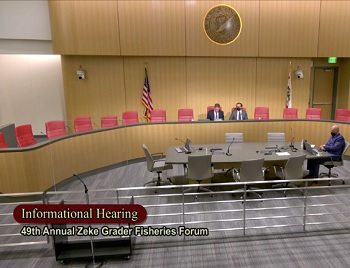
‘A healthy ocean means a healthy fleet’: salmon, crab, kelp, and climate the focus of annual fisheries forum
Dispatches on the state of California’s fisheries this year have brought “a mix of some glimmers of better news, while still struggling with difficult issues,” California Department of Fish and Wildlife (CDFW) Director Chuck Bonham summarized at the 49th Annual Zeke Grader Fisheries Forum on Wednesday afternoon. The forum was moderated by State Senator Mike McGuire as part of the Joint Committee on Fisheries and Aquaculture. In addition to a detailed report from Bonham, the afternoon featured panels on drought and salmon, the dungeness crab season, the state of California’s kelp forests, and aquaculture — as well as a brief public comment period. >click to read< 19:16
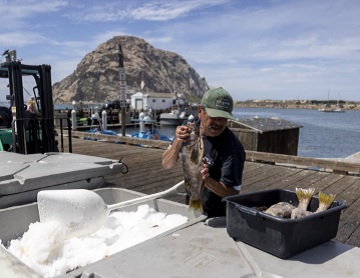
California Offshore Wind Projects Face Hurdles as Pressure Groups, Industry Interests Weigh In
As the Biden administration plans for the country’s first West Coast offshore wind turbines, interests ranging from commercial fishing fleets to powerful environmental groups are complicating the road ahead for the California projects. Some fishermen are worried about losing access to swaths of rich fishing grounds, where they would have to stop towing nets that could get caught on underwater cables. Lori Steele, executive director of the West Coast Seafood Processors Association, said offshore wind power projects threaten an industry that also must deal with depleted fish stocks and soaring coastal real-estate prices. “We’re struggling to make sure that people understand that, just because you can’t see it, that doesn’t mean it’s not having an impact,” she said. There is early discussion about creating fishing compensation funds, similar to ones created by East Coast projects for financial losses, “but the industry doesn’t want to be bought out,” she said. >click to read< 08:08
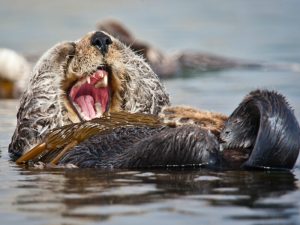
U.S. Fish and Wildlife Service Strategy to Reintroduce Sea Otters is Flawed
The USFWS study fails to estimate costs to taxpayers; impacts to key local fisheries such as Dungeness crab and sea urchin; neglects to fully examine the impacts to local port and harbor activities and fishing communities and fails to directly clarify to impacted Tribal Nations that no ceremonial and subsistence uses – or control of otter populations negatively impacting other important Tribal resources – are permitted under current Federal law. For Oregon and California coastal communities dependent on Dungeness crab, sea urchin, and other shellfish, reintroducing sea otters in an area where they have been absent for more than 100 years will spell big trouble. Yet, a recent report from the U.S. Fish and Wildlife Service (USFWS) concludes it is “feasible” to reintroduce them to Southern Oregon and Northern California. >click to read, with links< 08:19
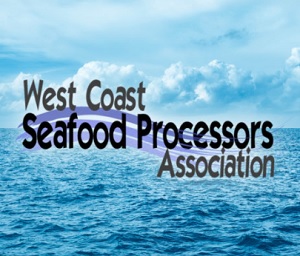
Seafood Industry Professions Raise Concerns About Reintroduction Of Sea Otters
West Coast Seafood processors says that their membership is concerned about a study on the impacts of sea otters on coastal fishing. The West Coast Seafood Processors Association says that they join other ocean stakeholders in a lack of confidence about concerns raised about the otters. “We remain very concerned that the issues we identified in our letter last year will not be adequately addressed in the Fish and Wildlife Service’s cost and feasibility study,” West Coast Seafood Processors Association Executive Director Lori Steele said. >click to read< 18:24
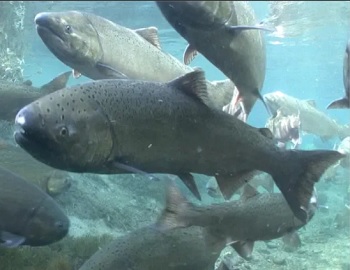
Critics rip feds’ “half-baked” plan to save California salmon
Fishing groups and water suppliers fought the Biden administration’s proposed drought rules for California’s water system, telling a federal judge Friday the emergency plans won’t stop the demise of endangered salmon. The rules call for new water temperature targets and improved collaboration between federal and state officials on the management of California’s two main water conveyance systems. But the Pacific Coast Federation of Fishermen’s Associations and other conservation groups cast the “interim operations plan” as a half-baked measure that will lead to a third consecutive year of salmon die-offs. >click to read< 17:36
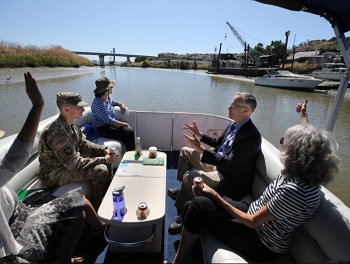
California poised to impose wave of boat emissions rules in 2022
Like users of lawn mowers and gas leaf blowers, working boat captains, excursion operators and fishermen will be asked told to get on board with new engine emissions regulations starting as early as 2022. The California Air Resources Board released its proposed emissions regulations on commercial boats in September. After hosting hundreds of meetings and receiving an opposing petition signed by thousands of sport fishers in California, the air quality agency expects to finalize the first in a montage of stricter guidelines to upgrade the boats by next spring. >click to read< 13:21
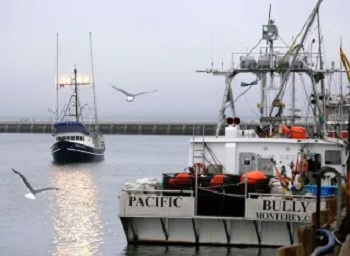
The Fishermen’s Climate Lawsuit Even the Fishermen Don’t Support
A surprising article has cast a spotlight on the discord in the Pacific Coast Federation of Fishermen’s Associations (PCFFA), a trade group of commercial fishermen and crabbers who filed a climate lawsuit three years ago. PCFFA members have soured on the case since it was filed and are speaking out about the hypocrisy of suing fossil fuel companies for producing the very products they rely on to power their fishing boats and question if litigation is the best way to address climate change. These comments are particularly noteworthy given how this case was launched in 2018. As EID Climate noted at the time, cozy ties between the leadership of the group and attorneys seemed to be the reason for the case. But as we see now, the group itself may not actually have been on board. >click to read< Toxic waters devastated Pacific Coast fisheries. But who’s to blame? – Union leaders say fossil fuel companies must pay for rising ocean temperatures. Not all boat captains are persuaded, >click to read< 10:30
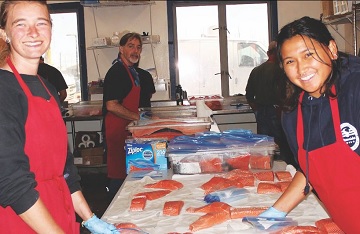
As Salmon and Squid Seasons Rebound, New Questions
Over the last few months, hundreds of boats have been fishing off of, or transiting along Santa Cruz County’s coastline. Industry analysts report plenty of bright spots in both the salmon and squid markets this season. But after some scientific studies were scuttled last year because of the coronavirus pandemic, and other research couldn’t be completed due to wildfires, fisheries management is still undergoing its own pandemic comeback, as climate change fears remain ever-present. “It’s definitely been a good season,” Scotts Valley resident Hans Haveman, the CEO of H&H Fresh Fish at the Santa Cruz Harbor says during a late-June interview. “Unfortunately, regulation from the state and feds have shut us down right when it’s goin’ good.” video, >click to read< 08:50
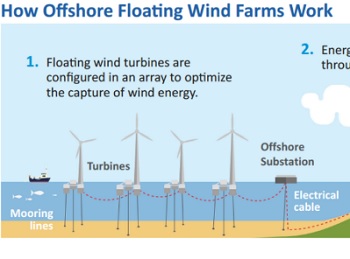
Biden opens (condemns) California coast to floating offshore wind turbines – “We believe it’s shortsighted,”
The announcement, endorsed by Gov. Gavin Newsom, moves forward the prospect for wind farms in two areas about 20 miles off the coast of Morro Bay and Humboldt County. Turbines roughly 600 to 700 feet tall would be built on floating platforms because the water is too deep to anchor them to the sea floor. “We believe it’s shortsighted,” said Mike Conroy, executive director of the Pacific Coast Federation of Fishermen’s Associations, “Floating offshore wind technology is unproven. It hasn’t been deployed on a large industrial scale yet. We have no idea what the environmental impacts will be off our coast.” >click to read< 13:16
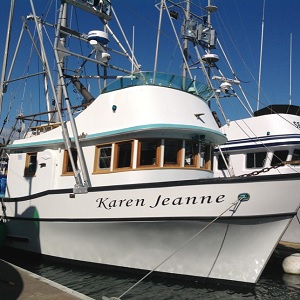
California salmon season delayed and shortened, angering North Bay fishermen. Closest start may be May 1
Expected to be decided within the next few weeks, there are three proposals on the table, all shorten the season considerably. The closest start may be May 1, instead of April. Association President John McManus predicted a 40% loss in the season for sports fishermen, while Crescent City commercial fisherman George Bradshaw predicted the industry’s take would be down by two thirds. The bad news for a delayed and restricted salmon fishing season comes on the heels of a slow, sputtering start for crab fishing fleets, which were stalled while fishery officials waited for migrating whales to leave the coastal region. >click to read< 08:05
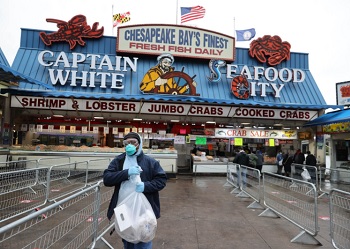
The Coronavirus pandemic could change U.S. fisheries forever. Will it be for better or for worse?!
The first symptoms appeared long before Covid-19 gained a stronghold on U.S. shores, as China went into its first lockdown and a critical export market disappeared overnight,,, Then as social distancing rules kicked in here, another major organ of the U.S. supply chain, restaurants, where most seafood purchases are made, fell limp. Many fishermen across the country have pivoted to direct-marketing models by selling their catch off their boats,,, To many in the food industry, the pandemic’s impact has exposed the fundamental vulnerabilities of a system that has long favored efficiency over resilience. >click to read< 09:48
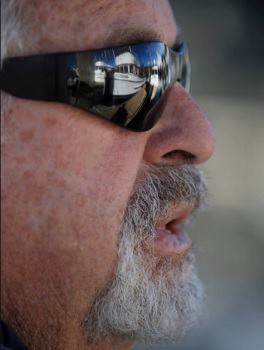
California: Don’t expect Dungeness Crab for Christmas this year
“Unless a miracle happens, which is highly unlikely, we won’t see crab for Christmas,” said Tony Anello, a veteran fisher who runs his boat, the Annabelle, out of Bodega Bay and offers up his tender product at Spud Point Crab Co. After several years of varied setbacks and more than a month of delays to the 2020 Dungeness season, local crabbers now face a new hurdle as they haggle over price with large wholesalers. “We should be traveling right now,” Dick Ogg,,, wholesalers are asking skippers to cut their prices by 30% to 35%, leaving both sides approximately $1 a pound apart from an agreement that would start the crab season. >click to read< 08:05
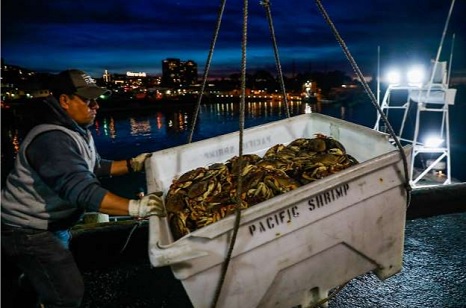
Dungeness crab season might not open for Thanksgiving again
New state regulations may mean that Dungeness crabs won’t be in stores in time for Thanksgiving. The rules, aimed at preventing entanglements “I want to make sure it’s understood what kind of effort we’re putting into it as fishermen and how effective we’ve been,” said Dick Ogg, a Bodega Bay fisherman and a member of the California Dungeness Crab Fishing Gear Working Group that developed the rules. He said that fishermen have worked hard to make sure their gear is set up better to lower risk. “We’ve really reduced our interaction and entanglement rates.” Ogg said there is a lot of anxiety in the fishing fleet about what will happen with the coming season and whether they should start gearing up for a Nov. 15 opening or whether it will be delayed. >click to read< 10:01
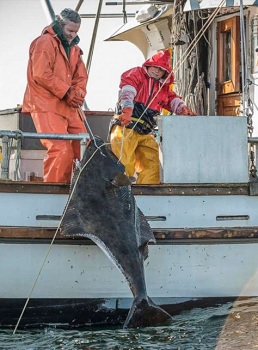
Fishermen, farmers suffering from food supply disruptions concerned for what’s to come
As the coronavirus has spread through the U.S. over the last two months, it has dealt a significant blow to the country’s food supply chain and driven the price of products down so much that those who source them aren’t sure if they’ll get a return on the time and money they’ve invested over the last year. Many are now concerned about what the rest of the year will look like and what it means for the foods they grow. For some fishermen, however, the risk of losing money is too high. California’s commercial salmon season began on Friday, but Mike Conroy, executive director of the Pacific Coast Federation of Fishermen’s Associations, says that with the markets “upended” and 75% of California salmon purchased by restaurants, many fishermen might not go through the trouble of fishing. >click to read< 09:16
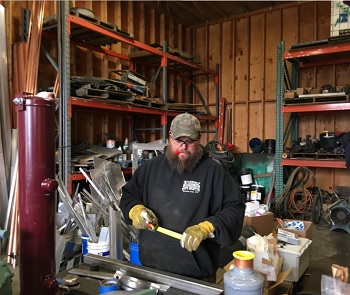
Coronavirus: Restaurant Closures Put Oregon Seafood Industry In Limbo
Commercial fisherman Clint Funderburg should be on the ocean right now, catching Dungeness crab on his fishing boat, the Widgeon. When crab prices tanked a few weeks ago, he shifted gears to his off-season side gig. So, he’s building a refrigeration system for one of the many fishing boats that are stuck at the dock right now. Mandatory restaurant closures during the coronavirus pandemic have sent shock waves through Oregon’s $700 million seafood industry. The overwhelming majority of the seafood that lands on Oregon’s docks gets eaten in restaurants, and no one knows when that market will return. In the meantime, fishermen are parking their boats as seafood prices plummet. >click to read< 18:04

“Looking Back”: The Keep Fishermen Fishing Rally
Measured by any meaningful criteria the Keep Fishermen Fishing rally held on the steps of the Capitol on March 21 was a stunning success. It was attended by thousands of fishermen from as far away as Alaska, twenty one Senators and Members of the House of Representatives, and at least a half a dozen other VIPs made room in their busy schedules to come out and address the people who attended. From the most conservative of the conservatives to the most liberal of the liberals, these politically divergent speakers had one message; fix the Magnuson Act and bring back the balance between conservation and harvest. For the second time at the national level recreational and commercial fishermen – no matter what fisheries they participated in, no matter what their disagreements on allocation or lesser issues were, and no matter where they were from – were standing together and demanding a return to the original intent of the Magnuson Act;,,, >click to read< 08:09
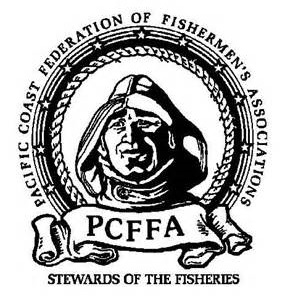
Job Opening: Executive Director, Pacific Coast Federation of Fishermen’s Associations
PCFFA and IFR seek an Executive Director to carry out their collective fisheries and environmental policy missions,, The PCFFA and IFR Executive Director is responsible for management of operations, development, budgeting, policy and legal strategy, government relations, human resources, communications, and member engagement.,,, A competitive salary and benefits package is offered. PCFFA provides a company vehicle to the Executive Director. Our beautiful office is located on the waterfront in San Francisco’s Presidio, and the freshest, most sustainable seafood on the planet is part of the compensation package. >click to read< 07:00
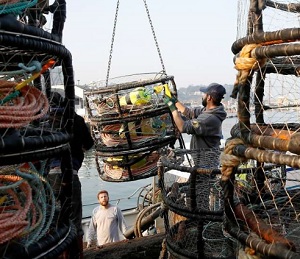
Dungeness crab season may be delayed
The California Department of Fish and Wildlife made the announcement Friday in response to a settlement with an environmental group over whale entanglements in commercial Dungeness crab fishing gear.,,, Even if the eight-day delay to the commercial season happens, it should not disrupt the Bay Area tradition of cracked Dungeness crab on the Thanksgiving table, said Noah Oppenheim, executive director of the Pacific Coast Federation of Fishermen’s Associations. However, it would cut into a peak period for the local fishing fleet, >click to read< 08:02


































